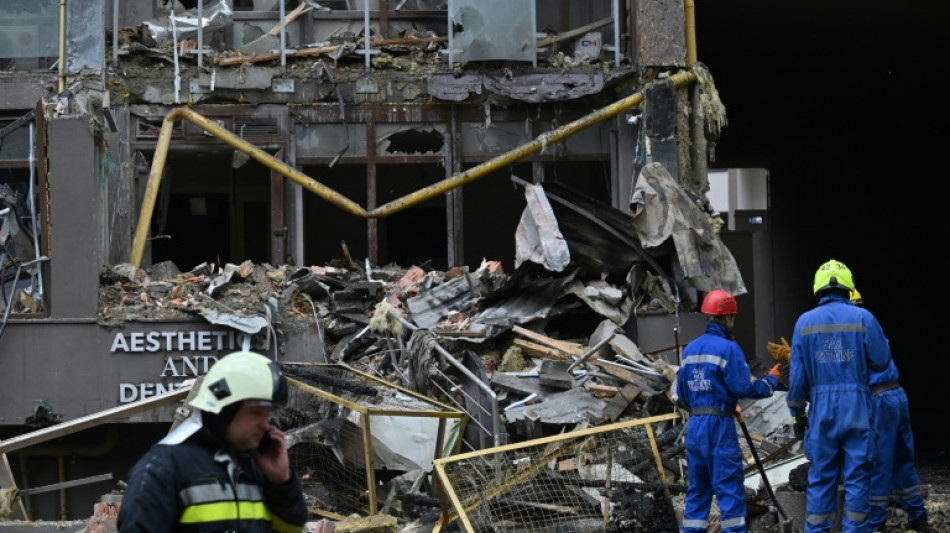

G7 to pledge fresh support for Ukraine as war rages
Leaders of the G7 were on Monday expected to announce new economic measures to tighten the screws on Moscow, as Ukrainian President Volodymyr Zelensky appealed for more help in fending off Russia's invasion.
US President Joe Biden and his counterparts from the Group of Seven wealthy democracies are holding a three-day summit in the Bavarian Alps that has been dominated by the war in Ukraine and its global fallout.
Zelensky joined the leaders of the United States, Germany, Britain, France, Italy, Japan and Canada via video link. He was expected to ask for more heavy weapons and tougher sanctions against Moscow.
The high-level talks come a day after Kyiv suffered the first Russian onslaught on the capital in three weeks, Ukraine said, with a missile attack hitting a residential building and leaving one person dead.
Two women were also killed by Russian bombardments on the northeastern Kharkiv region over the past 24 hours, the local governor said on Monday.
Among the new action being weighed by G7 leaders was a price cap on Russian oil imports and fresh sanctions on Russia's defence sector, the White House said on Monday.
In his evening address late on Sunday, Zelensky renewed his calls for more weapons and air defence systems.
"Delays in the transfer of weapons to our state, any restrictions, are actually an invitation for Russia to strike again and again."
The G7 summit, held at the luxury Elmau Castle, runs until Tuesday. It will be followed by a meeting of NATO countries in Spain which Zelensky is likewise expected to dial into.
European Commission President Ursula von der Leyen, attending the G7 gathering, stressed the message of unity among Kyiv's allies.
"We will support Ukraine for as long as necessary," she told reporters on Sunday.
Last week, the European Union showed its support by granting Kyiv candidate status.
- Oil, tariffs -
G7 members kicked off their gathering on Sunday by announcing a plan to ban on imports of Russian gold, the latest in a series of sanctions aimed at punishing President Vladimir Putin for his February 24 invasion.
But as the war drags on, its impact on other countries has intensified, with soaring food and energy prices driving up global inflation and fanning fears of recession.
British Prime Minister Boris Johnson warned his fellow G7 leaders not to give in to "fatigue" and said Ukraine would need long-term help.
A senior US official on Monday said the G7 had made progress on talks to set a price cap on Russian oil.
The move would have the twin goals of starving the Kremlin of a key revenue stream for its war machine while forcing down the price of Russian oil in the hopes of reining in inflation, the official said.
European Council President Charles Michel however said on Sunday that all 27 member states would have to agree to such a price cap, which would require tweaking existing sanctions.
Biden and his G7 counterparts will further announce new sanctions targeting Russia's defence industry at the summit, the US official told reporters.
The leaders also share the view that money collected from higher trade tariffs imposed on Russian exports should be funnelled as aid to Ukraine "to ensure that Russia pays for the cost of its war", the official added.
- Food shortages -
Downing Street for its part said Johnson would call for "urgent action" to get Ukraine's vital cereal exports moving again, which have been held up by Russia's blockade of key ports.
With millions of tonnes of grain trapped in silos, concerns are growing that African nations highly reliant on Ukrainian exports could face famine.
Non-G7 countries Argentina, Indonesia, India, Senegal and South Africa have been invited to join the G7 summit from Monday.
Indonesian President Joko Widodo, who will host a G20 summit in November, has said he plans to use the trip to also visit Ukraine and Russia in the coming days to ask Putin and Zelensky to open a dialogue for peace.
Indonesia, like most major emerging economies, has tried to maintain a neutral position, and Widodo has not bowed to Western pressure to exclude Putin from the November meeting.
- 'Intimidate Ukrainians' -
On the ground in Ukraine, Kyiv mayor Vitali Klitschko said Sunday's missile attack on the city was a Russian attempt to "intimidate Ukrainians" ahead of the NATO meeting.
Tearful residents recounted the moment the missiles struck.
"I woke up at the first explosion, went to the balcony and saw missiles falling and heard a huge explosion -- everything vibrated," 38-year-old Yuri told AFP, declining to give his surname.
Russia denied it had hit a civilian target, however, saying its forces had struck the Artyom weapons factory in the neighbourhood.
Biden condemned the strikes on Kyiv as "barbarism".
German Chancellor and G7 host Olaf Scholz said the attack showed again "that it is right to stand together and support Ukrainians".
- 'Fully occupied' -
After failing to capture Kyiv early on, Russian troops shifted their focus to the eastern Donbas region, which has been partially under the control of pro-Moscow separatists since 2014.
The Russians made a strategic breakthrough on Saturday when they took the industrial hub of Severodonetsk, the scene of weeks of fierce battles that have left it largely destroyed.
Its capture would give Russia control of the entire Lugansk region in the Donbas.
H.Gallo--IM




